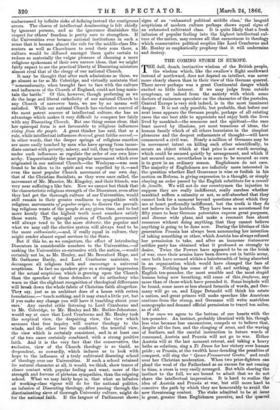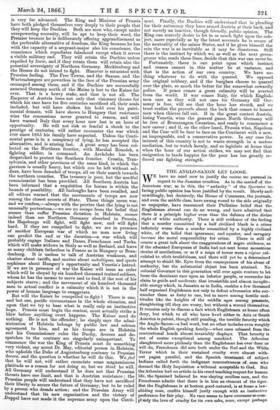THE COMING STORM IN EUROPE. T HE dull, dumb, instinctive wisdom
of the British people, the wisdom which, like the swallow's flight southward instead of northward, does not depend on intellect, was never more clearly shown than in their view of this German quarrel. There never perhaps was a great Continental danger which excited so little interest. If we may judge from outside symptoms, or indeed from the anxiety with which some doctors of eminence speculate on the character of the pustules, Central Europe is very sick indeed, is in the most imminent danger. It is not only possible, but probable, that before our next issue appears the German people, perhaps of all existing races the one best able to appreciate and enjoy both the lives lived by mankind—the sensuous and the spiritual—the race least moved by illusions, yet most tenacious of ideas, the human family which of all others luxuriates in the simplest pleasures and the deepest refinements of thought—will have commenced a civil war. Nearly a million of Germans may be in movement intent on killing each other scientifically, to secure an object which at that price is not worth securing, which could be secured quietly by arrangement, and which if not secured now, nevertheless is as sure to be secured as corn is to grow in an ordinary season. Englishmen do not care. The majority of Englishmen are infinitely more interested in the question whether Earl Grosvenor is wise or foolish in his motion on Reform, is giving expression to a thought, or simply obeying an order passed by the English substitute for a conseil de famille. We will not do our countrymen the injustice to suppose they are really indifferent, really careless whether mankind suffers a calamity or not, so self-absorbed that they cannot look for a moment beyond questions about which they are at heart profoundly indifferent, but the truth is they do not believe in the hubbub. They have been so accustomed for fifty years to hear German potentates express great purposes, and discuss wide plans, and make a resonant fuss about resources without doing anything, that they cannot believe anything is going to be done now. During the lifetime of this generation Prussia has always been announcing her intention of taking something or other, which Austria has always refused her permission to take, and after an immense tintamarre neither party has obtained what it professed so strongly to desire. Twice the Powers have appeared to be on, the brink of war; once their armies have been drawn out in battle array, once both have seemed within a hairsbreadth of being absorbed in an organization which would have changed the face of Europe. Nothing has come of it all, and nothing, says the English ten-pounder, the most sensible and the most stupid human being now breathing, will come of this fanfaron, any more than of those which have preceded it. Some loophole will be found, some more or less absurd formula of words, and Ger- many will go on, and Lippe Detmold will think his estate a nation, and great princes will make speeches like American orations from the stump, and Germans will write matchless monographs and demand official permission to travel ten miles, as of old.
For once we agree to the bottom of our hearts with the ten-pounder. An instinct, probably identical with his, though less wise because less unconscious, compels us to believe that, despite all the fuss, and the clanging of arms, and the waving of feathers, and the careful instruction in future words of command, Austria and Prussia will not go to war. Either Austria will at the last moment retreat, and taking a heavy bribe as solatium, sing a Te Deum for her victory over human pride ; or Prussia, at the twelfth hour dreading the penalties of conquest, will sing the " Quare Fremuerunt Genies," and exult over her Christian moderation. When two prize-fighters can plead the weal of the Fatherland as an excuse for not coming to time, a cross is very easily arranged. But while sharing the instinct to the full, we are bound to admit that we do not share the intellectual impression. It is hard to realize the idea of Austria and Prussia at war, but still more hard to conceive the path by which they are honourably to avoid the now threatening contest. The stake admitted to be at issue is great, greater than Englishmen perceive, and the quarrel
is very far advanced. The King and Minister of Prussia have both pledged themselves very deeply to their people that they will keep the Duchies. Both are men who, except under overpowering necessity, will be apt to keep their word, the Premier because he is deliberately offering aggrandizement as the preferable alternative of freedom, the King because he has with the capacity of a sergeant-major also his conscience, the conscience which repudiates falsehood except when it serves a visible military end. They will retain the Duchies unless expelled by force, and if they retain them will retain also the potential sovereignty of Northern Germany. Mecklenburg and the Hesses do not intend to fight. Hanover is saturated with Prussian feeling. The Free Towns, and the Saxons, and the Wurtenabergers are powerless in the face of the Prussian army encamped among them, and if the Duchies are successfully annexed Germany north of the Maine is lost to the Kaiser for ever. That is a heavy stake, and that is not all. The Emperor of Austria loses not only that visionary throne for which his race have for five centuries sacrificed all, their souls included, but will have shaken his hold over his patri- monial domain, will have shown to Hungary that resistance wins the concessions never granted to reason, and will have warned Italy that every hour now lost is an hour of opportunity. He will not risk so fearful a shock to the prestige of centuries, will rather encounter the war which ever since 1815 his family have expected. Unless the Conti- nental press is in a conspiracy of lying, he has accepted the alternative, and is arming fast. A great army has been col- lected on the Northern frontier, with Marshal Benedek, a fighting soldier, in command. An Archduke has been despatched to protect the Southern frontier. Croatia, Tran- sylvania, and other provinces of the same kind, in which the garrison is usually heavy, but which can be left without sol- diers, have been denuded of troops, all on their march towards the northern counties. The treasury is poor, but the needful commissariat has been provided. All Southern Austria has been informed that a requisition for horses is within the bounds of possibility. All furloughs have been recalled, and all editors warned that the movements of troops are now among the closest secrets of State. These things mean war, and we confess,—always with the proviso that the lying is not unusually portentous,—we see no escape from the belief that sooner than suffer Prussian dictation in Holstein, sooner indeed than see Northern Germany absorbed in Prussia, the Hapsburgs will fight, will fight now, and will fight hard. If they are compelled to fight, we are in presence of another European war of which no man now living can predict the end or the duration—a war which will probably engage Italians and Danes, Frenchmen and Turks, which will make widows in Sicily as well as Zeeland, and leave as many children fatherless in France as in Hungary or Bran- denburg. It is useless to talk of Austrian weakness, and chatter about tariffs, and mutter about mitalliques, and quote sophisms about Hungary's opportunity and Venetia's hatred. If we are in presence of war the Kaiser will issue an order which will be obeyed by six hundred thousand trained soldiers, whom he has the means to move and to feed, if the rest of his subjects starve ; and the movement of six hundred thousand men to actual conflict is a calamity which it is not in the power of human language to exaggerate.
But will the Kaiser be compelled to fight f There is one, and but one, pacific circumstance in the whole situation, and upon that we try to base what is really only an instinctive hope. Prussia must begin the contest, must actually strike a blow before anything overt happens. The Kaiser need do nothing. He is not the offender ; he simply says the admi- nistration of Holstein belongs by public law and solemn agreement to him, and as his troops are in Holstein and his Commissioner rules the Duchy, decrees and de- spatches to the contrary are singularly unimportant. To commence the war the King of Prussia must do something very violent, say arrest Dr. May, editorial person in Holstein, who upholds the Duke of Augustenburg contrary to Prussian decree, and the question is whether he will do this. We feel that he will not, will rather enunciate some magnanimous platitude as a reason for not doing so, but we think he will. All Germany will understand if he does not that Prussian threats have one limit, and that is Austrian resistance ,• the Prussian people will understand that they have not sacrificed their liberty to secure the future of Germany, but to be ruled by a person who dreads action; and the Prussian Army will understand that its new organization and the victory of Duppel have not made it the supreme army upon the Conti-
nent. Finally, the Duchies will understand that in pleading for their autonomy they have armed Austria at their back, and not merely an inactive, though friendly, public opinion. The King can scarcely desire to let in so much light upon the sub- ject, more especially as by the latest accounts he is secure of the neutrality of the minor States, and if he gives himself the rein the war is as inevitable as it may be disastrous. Still there is the instinct by which we, as well as the next green- grocer who reads these lines, decide that this war can never be.
Fortunately, there is one point upon which instinct and reason cannot in this matter be at variance, and that is the action of our own country. We have no- thing whatever to do with the quarrel. We opposed the original robbery, and if the burglars choose to quarrel over the plate, so much the better for the somewhat cowardly police. If peace comes a great calamity will be averted from the world. If war comes Italy, for which English- men care as they will not care for Germany till Ger- many is free, will see that the hour has struck, and we trust realize the proverb about the luck that comes to honest men when thieves fall out. If in the great contest Austria, losing Venetia, wins the general game, North Germany will be free of Brummagem Csesarism, and ready to commence a new career ; and if, on the other hand, Prussia wins, Napoleon_ and the Czar will be face to face on the Continent with a new, an impregnable, and a conservative power. In any case the interest of this country is not to waste strength in a useless mediation, but to watch keenly, and so legislate at home that when the hour of our action strikes, we may not find that emigration to lands happier for the poor has too greatly re- duced our fighting strength.































 Previous page
Previous page